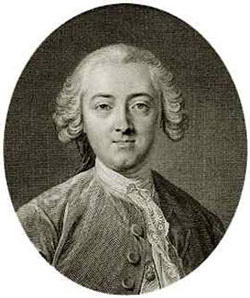| Profile | Major Works | Resources |
Claude-Adrien Helvétius, 1715-1771

French tax farmer, philanthropist and Enlightenment philosopher, Claude-Adrien Helvétius is widely regarded as a father of utilitarianism.
Born in Paris, Helvétius's name suggests a Swiss origin, but in fact his family, surnamed Schweitzer (later latinized to Helvétius), originated from the German Palatinate of the Rhine. They had fled to Holland during the wars of religion. His grandfather had been a famous alchemist and a doctor in the Dutch army, and subsequently emigrated to France to serve in the medical corps of the armies of Louis XIV. His own father had risen to the position of royal physician to the French queen, and written several notable medical tracts. His father's fortunes had, however, suffered from the machinations of the Cardinal Fleury, and he determined to set his son to rebuild the family fortune, and apprenticed him to a wealthy relative, a director of tax-farms in Caen. .
By his father's connections to the queen, Claude-Adrien Helvétius obtained the position of tax farmer in the lucrative ferme générale by the age of twenty-three, and soon accumulated a vast fortune (substantial parts of which he gave away to charitable causes). Never much given to business or court life, Helvétius dedicated much of his spare time to speculative philosophy, poetry and mathematics. Helvétius read John Locke in his youth, and considered himself an ardent Lockean disciple. The success of his friend Montesquieu's L'ésprit des lois in 1748 inspired him to try to change career and join the fledgling "republic of letters". Helvétius resigned his tax-farming position in 1751 to retreated to his estates in Perche and dedicated himself to studying philosophy.
After years of solitary study, Helvétius's finally published (anonymously) his grand treatise, De l'ésprit in 1758 It was an immediate succès de scandale.. The book was widely-read and promptly condemned by the Sorbonne, the Pope and the Parlement of Paris and burnt by the public executioner. The tidal wave of indignation overturned other boats. Although Helvétius did not contribute to the famous Encyclopédie, and Diderot even directed a polemical tract against him, the French authorities believed his dangerous ideas were fostered by it and thus the Encyclopédie was suppressed.
Like Condillac, Helvétius took a radical empiricist position, that man was born a tabula rasa and formed his knowledge from the senses and association of ideas. A radical hedonist, Helvétius argued that actions and judgments are generated by the natural desire (common to man and animals) to maximize pleasure and minimize pain. Consequently, human behavior is completely determined by education and social environment. He was condemned precisely because this deterministic theory of man seemed to exonerate immoral behavior.
However, Helvétius believed that human behavior could be made virtuous and socially beneficial just by setting up the appropriate pleasure/pain incentives and thereby channeling it in the right direction. His emphasis on education (particularly the importance of providing motivation to students) was particularly well-regarded. "Men are born ignorant, not stupid", Helvétius argued, but "they are made stupid by education". Rousseau, however, dedicated several passages of his Emile (which enjoyed its own succès de scandale) against him.
Helvétius was perhaps the first to articulate the utilitarian formula of defining social welfare as the "greatest happiness of the greatest number". His ideas were highly influential on Pietro Verri, Cesare Beccaria and, through them, the British utilitarians.
With scandal surrounding him, Helvétius did not publish again in his lifetime. The remainder of his works, including De l'homme, an explication of his earlier treatise which was even more uncompromising (it contained a denunciation of all religion), were published only after his death.
Some final notes of family curiosa: his wife, Anne Catherine "Minette" de Ligniville, was a renowned beauty in her day and very well-connected -- she was related not only to Voltaire's mistress, the Marquise du Chatelet, but also Queen Marie Antoinette herself (thus ensuring Helvétius's appointment as the queen's tutor). After his death, she famously became the object of old Benjamin Franklin's amorous attentions.
Major Works of Helvétius
|
|
HET
|
|
Resources on Helvétius
|
All rights reserved, Gonçalo L. Fonseca
